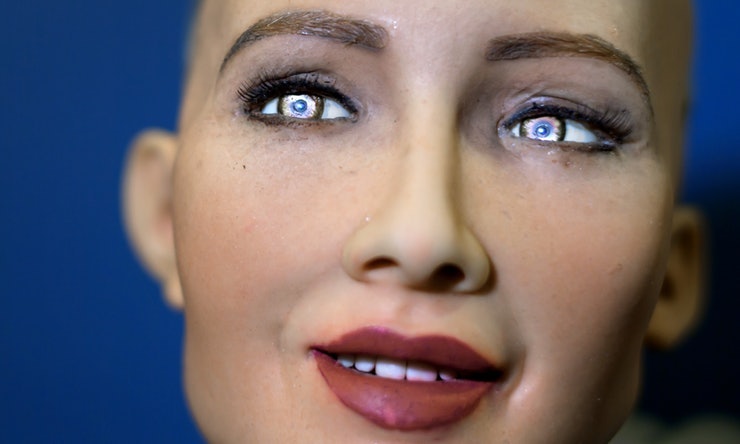Calling Rick Dekard
As if the natural process of staying alive and well on planet Earth wasn't vexing enough, we now come to understand that our scientific community, aided in part by the techno-weenies in Silicon Valley, is doing its best to develop more artificial life to compete with us, the endemic human race. Well. Isn't that special?
 |
| Those are some freaky eyes! |
In an interview with Sophia, a fully developed artificial cyborg - that means robot - we learn that it - er, she - would like to have a baby, thinks a cyborg/human brain would be a good thing, no longer pines for the destruction of humanity, and oh, yeah, would like to develop more human-like emotions. How enlightened. Saudi Arabia granted it - er, her - citizenship, as well as appointed it knowledge ambassador for the the Mohammed bin Rashid Al Maktoum Knowledge Foundation. Well. A few weeks ago, ISIS announced that it will take their jihad fight to the US through robots. And drones. Maybe they can. And will. This Sophia machine was developed by a Hong Kong company, and our own techno-weenies in the US are beside themselves to catch up. MIT has developed a frightening running quadruped, named Cheetah, that is outright scary. And the silly but destructive feminist movement has so alienated heterosexual men in American culture that they seek life without women. See MGTOW. Of course, one unintended consequence of this race for AI beings is the advent of the sexbot. Forget virtual reality porn, you can buy one here.
And speaking of creation, rather than pursue the mechanical/electrical robotic models like most scientific labs have done, U.S. researchers have
developed a living organism that incorporates both natural and
artificial DNA and is capable of creating entirely new, synthetic
proteins. This is a major step toward creating artificial life. Really. No problem, the scientists tell us, it's all controlled. It can't escape into the wild and genetically change anything. Just like Round Up, I'm sure. The fact that the developers are interested in using this expanded genetic alphabet - the new X and Y proteins along with the natural G, C, A, and T - to
create new types of proteins that can possibly be used to treat disease isn't sufficient to dissuade skepticism. They developed these two new DNA markers originally as a new strain of E. coli bacteria, after all. I'm reminded of Dr. Malcolm's prescient observation in Jurassic Park, "Life will find a way." Yep. What could possibly go wrong?
| Calling Rick Deckard |
Too much change in the natural order will invariably affect the matrix of life and balance. Should these robots, or some genetically modified organisms - these constructed replicants - inevitably go rogue, the unintended consequences we'll endure will most certainly necessitate a new breed of hunter.
So maybe we really do need a Blade Runner.

No comments:
Post a Comment